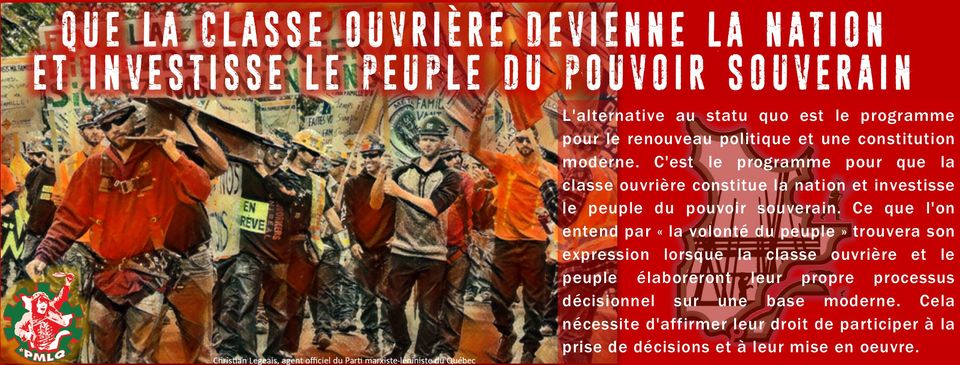September 30, 2022 - No. 21
October 3 Quebec Election
Marxist-Leninist
Party of Quebec Campaigns
for Democratic Renewal and
People's
Empowerment
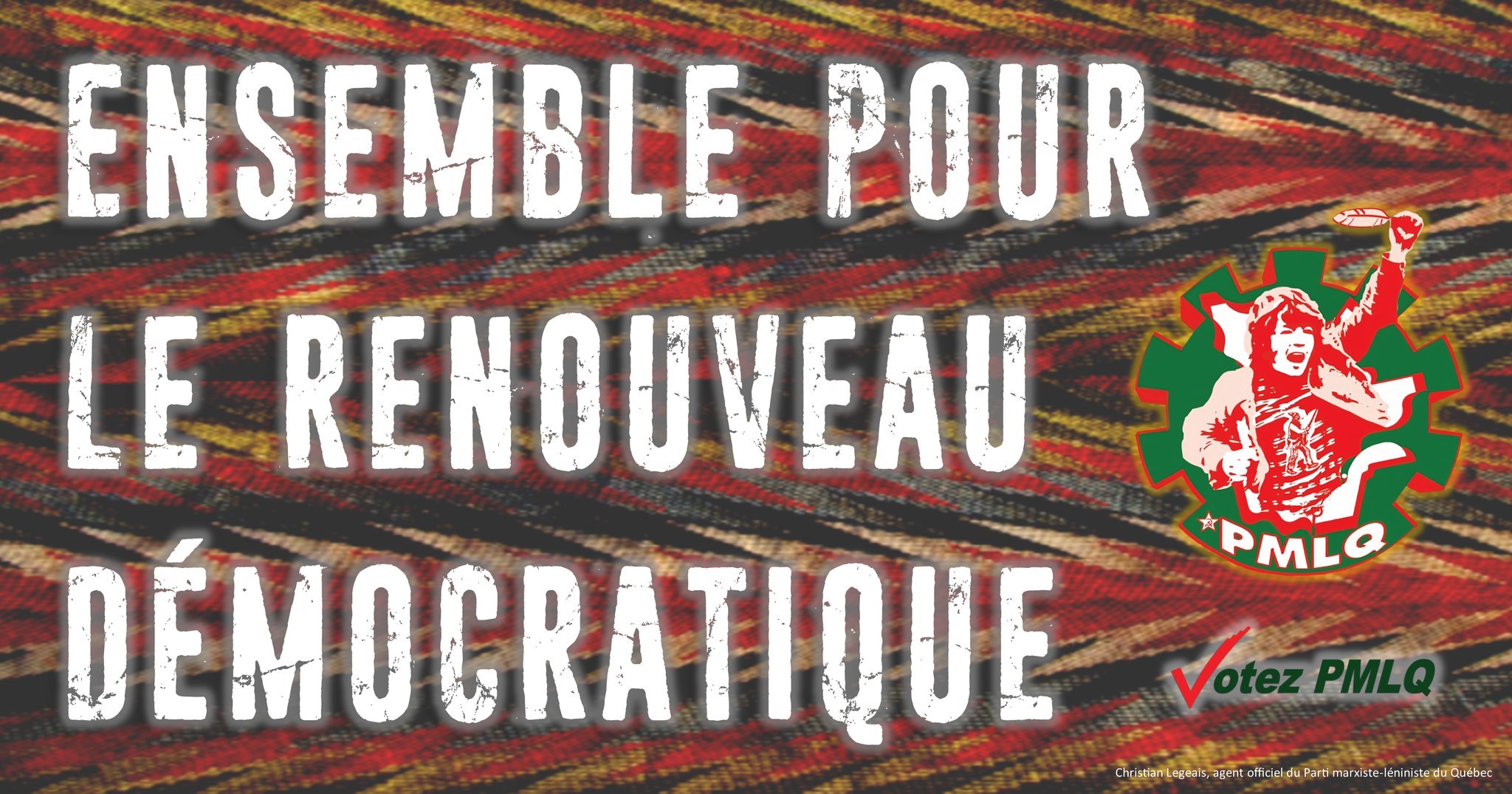
• Call
for
Workers and Youth to Reject the Upcoming
Legault Government
Election Issues
• We Cannot
Leave Our Fate in the Hands of
Cartel Party Governments
• Green
Electrification and Mining Plans that Clash with
the
People's Wishes
• Mining
Town of Rouyn-Noranda Demands Government
Uphold
Environmental Standards
• About the Labour Shortage and the Environment
For Your Information
• Candidates and Political Parties in October 3 Election
October 3 Quebec Election
Marxist-Leninist Party of Quebec Campaigns for Democratic Renewal and People's Empowerment
|
The Marxist-Leninist Party of Quebec (PMLQ) is presenting twelve candidates for election in Quebec on October 3. Six women and six men are presenting themselves for election -- six in Montreal, three on Montreal's south shore, two in Quebec City and one in Gatineau.
The electoral system and monopoly media privilege the parties in the Legislature by providing millions of dollars from the public purse and free promotion for their campaigns. Small parties and independent candidates are dismissed and the population itself is marginalized. The participation in the election by the PMLQ gives the working people a platform to speak in their own name about their conditions of life and work and the solutions they know through experience will contribute to resolving the problems they face. These are the solutions which are not put forward by the main cartel party the ruling elites have chosen as their champion in this election, who the polls predict will win a sweeping majority.
The logic of the establishment is that an election is held to form a party government and nothing else matters. The PMLQ is calling on electors to break with the politics of disempowerment and affirm that there are alternatives to the current state of affairs and direction for Quebec.
The PMLQ's campaign is based on democratic principle, not self-serving expediency. "As working people we can speak for ourselves and must have a say in the affairs of our workplaces, educational institutions, communities, villages, towns, cities and all of Quebec. Join us in the work for democratic renewal and people's empowerment!" the PMLQ writes.

Call for
Workers and Youth to Reject the
Upcoming Legault Government
A Legault majority government is predicted as the outcome of the Quebec election which will take place on October 3. Already the situation of rising costs, fewer services and increasing problems of all kinds has tangibly raised tensions within the society, giving rise to more desperation and problems which exacerbate an already untenable situation. Unacceptable levels of homelessness, hunger, violence against women and minorities, discrimination and state-promotion of racism, criminalization of conscience and dissent are increasing. So too are the government sanctioned projects which pay the rich in the name of high ideals and privatize social programs which push people into "fend for oneself or perish" situations.
Quebeckers do not accept this and are fighting against it. In light of what is actually happening, what does a majority Legault government hold in store for them?
A Legault majority government will act in the name of Quebec nationalism. It will spare no efforts to concentrate police powers in the hands of the executive which will get laws passed by the National Assembly to that effect. For this reason, in this election it is important to cast ballots in a manner that does not permit this government to claim that the people support such a mandate. This can be done by providing a low turnout (abstaining) which shows rejection of the unrepresentative electoral system. It can also be done by going all out to vote for candidates who will use their position to stand for what is right, not what is expedient to preserve pretentions that they have better solutions and in this way to preserve the status quo.
Furthermore, members elected can be called on to refuse to swear allegiance to the King of England called the King of Canada. Should they be prohibited from taking their seats, they should create public opinion over the question of whether a member is elected to represent the people or the constitutional order presided over by this King that represents alien interests. If they can provoke a constitutional crisis it will be an opportunity for everyone to get involved in discussing what kind of constitutional order serves them.
This is important because the vote results will show the fraud of elections under a constitutional order where the people are not represented. This constitutional order permits the executive power to issue decrees in the name of values and interests which are those of the rich and the U.S. warmongers. It permits the rich to become richer at the expense of the majority of the people who are pushed into poverty and reduced to "things" which count for nothing. All of it is done in the name of high ideals and Quebec nationalism. The liberal variant, à la Trudeau federally and those who demand the values called multiculturalism for Quebec, is not an alternative but part of the same package. Both the assimilationist path on the basis of multiculturalism and the nationalist variant known as integrationism amount to exactly the same thing -- the rule of the financial oligarchy over the whole of society which is deprived of political power.
Both variants speak in the name of peace, freedom, democracy
and Quebec values. They are reflected on the global scene in the U.S.
and Europe, where the people are being dragged into tragic civil wars
at home and destructive wars abroad, even World War III. In the U.S.,
the Biden side of the
equation, like the Trudeau Liberals and the NDP in Canada, wants to
concentrate more powers in the hands of the executive while preserving
what they call constitutional order. They do this in the name of
opposing authoritarianism and upholding human rights but their record
at home and abroad makes
these claims not credible. Like them, the Trump side also wants to
wield police powers uncontested. The first Trump administration and
attempted coup d'état on January 6 and the current line of march
of these forces show their aim to use the presidency, the judiciary and
Congress to smash the current constitutional order -- no pretense
whatsoever of being anti-racist or in solidarity with anyone.
All of this will also impact the sectarian factional fights in the post-election Quebec.
 A government of police powers
is not the same as speaking about a government which declares martial
law or military rule. The police powers are the prerogative powers
which are exercised above the legislative framework. It shows that the
old forms of rule and governance no longer function. They
were created to fetter the prerogative powers by having a functional
legislature which would sort out differences between the ruling
factions and give the rule of an elite over the people credibility. In
Europe what are called fascist forces -- characterized by racism and
anti-immigrant policies and
propaganda called right-wing nationalism, are gaining against the
so-called liberal left and allegedly centrist forces and governments
and their striving for control over the productive powers which operate
independent of them. The situation is dangerous indeed and cannot be
sorted out by siding
with one side or the other. It can only be sorted out by the working
class taking militant stands which defend its claims on society and
those of society itself.
A government of police powers
is not the same as speaking about a government which declares martial
law or military rule. The police powers are the prerogative powers
which are exercised above the legislative framework. It shows that the
old forms of rule and governance no longer function. They
were created to fetter the prerogative powers by having a functional
legislature which would sort out differences between the ruling
factions and give the rule of an elite over the people credibility. In
Europe what are called fascist forces -- characterized by racism and
anti-immigrant policies and
propaganda called right-wing nationalism, are gaining against the
so-called liberal left and allegedly centrist forces and governments
and their striving for control over the productive powers which operate
independent of them. The situation is dangerous indeed and cannot be
sorted out by siding
with one side or the other. It can only be sorted out by the working
class taking militant stands which defend its claims on society and
those of society itself.
Quebec is itself caught in this maelstrom, this worldwide state of confused movement and violent turmoil. It is now up to the workers and youth to find a way forward for Quebec, Canada and their own future in the world. In the coming election the workers and youth can themselves decide what is the best way to show they reject this system of cartel party government which permits government of police powers to be brought into being.
As for the government to be elected, it will be very important to speak out against the government's use of a legislative majority to pass laws to give the use of these powers a legal veneer. This includes its use of the "notwithstanding clause" in the Canadian constitution which is said to defend Quebec's interest but in fact brings in legislation which divides the people, does not provide any problem facing the polity with solutions and does not reject the constitutional order enshrined in the Canadian constitution which is against Quebec's interests.
The opposition in the Legislature which claims to be the popular choice has a role to play in this regard. They need to see fit to rise to the occasion and act in accordance with the call of history. They must reject the role given them by the constitutional order which dictates they must limit their action to that of "a loyal opposition." Any claims that this is the responsible thing to do must be contested by the people because the situation is becoming far too urgent and far too dire to take any path which tries to escape the call of history. Marking time in such a way will not render the kind of service the people require.
Far from getting in any way discouraged, the working class must set a new course within which it must debunk the nonsense that its claim for higher wages to weather the current high cost of living fuels inflation, or that the workers are in any way responsible for the terrible recession which is looming when they demand social projects, infrastructure and laws which favour the well-being of the social and natural environment, not the rich. They must discuss and reject the constitutional order which permits government of police powers. They must expose the anti-people, anti-Quebec essence of this constitutional order while they push for democratic renewal and a modern constitution.
On every occasion, it is important to intervene in a manner that helps turn things around in favour of the people, no matter how difficult this may appear to be and in fact actually is. How to intervene in this election which marginalizes the people and ignores their concerns is no exception.
Organizing discussions to work out how matters pose themselves as the anti-social offensive continues to impose a tremendous burden on the people and society is a most important front of organizing work which faces us all in the coming period.
Election Issues
We Cannot
Leave Our Fate in the Hands of
Cartel Party Governments

Montreal, climate strike action, September 23, 2022
The demands of the youth and working people of Quebec for climate justice are prominent on their minds at a time disasters are hitting the people of the world, including eastern Canada and Quebec and the Legault government's "2030 Plan for a Green Economy" is comprised of more schemes to put even more money into the hands of wealthy private interests.
 The youth, who are front and centre at the actions to humanize
the natural environment and often the main organizers, have no
illusions about party governments in power when it comes to climate
change. Their hopes that courts would defend them were also dashed in
July 2022 when the Supreme Court
of Canada refused to hear their application to institute a class action
against the government of Canada on behalf of all Quebec residents aged
35 and under "for the insufficiency of its actions in the face of the
climate crisis."[1]
The youth, who are front and centre at the actions to humanize
the natural environment and often the main organizers, have no
illusions about party governments in power when it comes to climate
change. Their hopes that courts would defend them were also dashed in
July 2022 when the Supreme Court
of Canada refused to hear their application to institute a class action
against the government of Canada on behalf of all Quebec residents aged
35 and under "for the insufficiency of its actions in the face of the
climate crisis."[1]
The Coalition Avenir Québec (CAQ) website talks about "Initiatives to fight climate change," including reducing greenhouse gas (GHG) emissions through the "purchase and sale of GHG emission rights" by large corporations. This refers to aluminum smelters, foundries, steel mills, cement plants, pulp and paper mills, oil refineries, mines, maritime, land and air transport companies, which are all major polluters.
For those who are familiar with this scheme, it's called Quebec's cap-and-trade system for greenhouse gas emission allowances (SPEDE), a carbon market including Quebec and California. What it means is that companies in these sectors of the economy benefit from the right to pollute. The only condition is that if they exceed a certain threshold set by the government, they must purchase credits to compensate for having exceeded the limit.[2]
In other words, these companies can continue to pollute as long as they pay a fine. When this system was developed in 2006 by the Jean Charest Liberal government, the claim was that it would still encourage large polluters to seek technological solutions to reduce pollution. And who pays for these technological changes? The answer is that the money is to be taken from the Green Fund set up by the Quebec government at that time. On a yearly basis, large sums of money, in the hundreds of millions of dollars, are generated by the various companies and individuals entitled to participate in the "buying and selling of GHG emission rights" at auctions held four times a year between Quebec and California.
This "Green Fund," now called the Electrification and Climate Change Fund (ECCF), is a windfall for the big polluters who can in turn request subsidies from the various Quebec government departments to supposedly reduce annual GHG emissions. Thus, in the documents made public in the past on the Green Fund by the Ministry of the Environment and the Fight against Climate Change, we learn that for the period between 2008 and 2013, transportation monopolies such as Canada Steamship Lines, Bombardier and CN, mining monopolies such as Rio Tinto and the Alouette aluminum smelter, pulp and paper mills owned by Kruger and others, have been able to pay for ships, locomotives, the bulk transport of alumina, the transport of wood at the expense of the Government of Quebec's Ministry of Transport, to the tune of millions of dollars. In other words, the amounts paid in fines by these large industries for the right to pollute are returned to them in the form of state subsidies.[3]
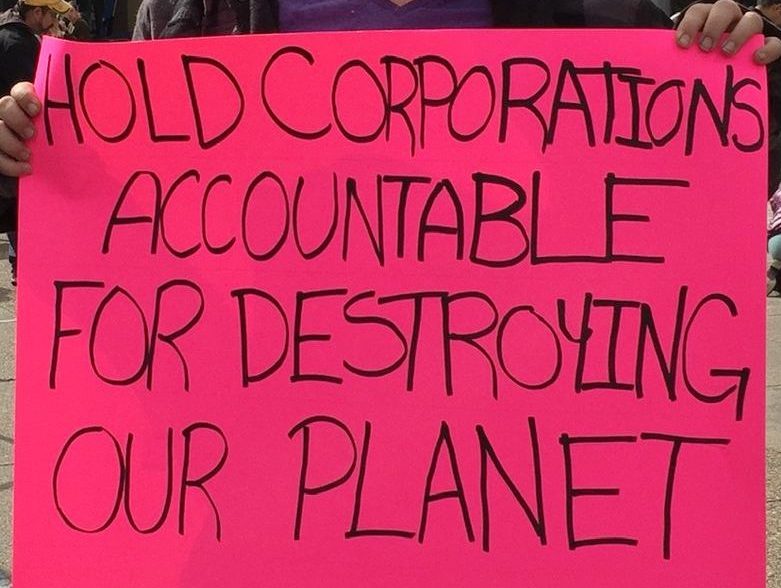 Some industrial GHG emitters are even exempted from paying
these fines to the Quebec government because they are "exposed to
strong national or international competition." As revealed last August,
89 companies in the pulp and paper, mining, aluminum, metallurgy,
cement, pelletizing and steel
industries are exempt from the air and water environmental standards
contained in the law. Many of these companies are owned by
foreign-owned oligopolies including: Rio Tinto, Arcelor Mittal,
Lafarge, Tata Steel, Kruger, Cascades and Resolute Forest Products.[4]
Some industrial GHG emitters are even exempted from paying
these fines to the Quebec government because they are "exposed to
strong national or international competition." As revealed last August,
89 companies in the pulp and paper, mining, aluminum, metallurgy,
cement, pelletizing and steel
industries are exempt from the air and water environmental standards
contained in the law. Many of these companies are owned by
foreign-owned oligopolies including: Rio Tinto, Arcelor Mittal,
Lafarge, Tata Steel, Kruger, Cascades and Resolute Forest Products.[4]
It should come as no surprise that once the election is over, a similar scenario will be proposed by the party in power to oppose the reduction of toxic metal emissions from the Glencore-owned Horne smelter in Rouyn-Noranda. Already, between 2009 and 2014, this mining corporation received over $1 million in government subsidies from the Green Fund for its operations in Deception Bay, Nunavik, where it extracts nickel from four underground mines, including Raglan and Katinniq.[5]
Through Bill 44, An Act mainly to ensure effective governance of the fight against climate change and to promote electrification, sponsored and adopted in October 2020 by the Legault government, it is now the Minister of the Environment and the Fight against Climate Change who has full powers to distribute the sums generated by the Green Fund to wealthy private interests, without having to disclose to whom these amounts are distributed. Thus, Radio-Canada reported on December 9, 2021, in an article entitled "Le Fonds vert toujours aussi opaque [The Green Fund As Opaque As Ever]," that the Quebec government's Public Accounts provide only a highly summarized overview of the Green Fund. "For the 2020-2021 fiscal year, more than $1 billion was spent by the various departments without us knowing exactly why. During the same period, revenues obtained mainly from a gas tax were $761 million," Radio-Canada reports.[6]
On the CAQ's website under the heading "The CAQ on the environment: best record in history?," there is not a word about the fact that in December 2021 the Legault government, at the request of the narrow private interests which control mining corporations such as Glencore and Vale, arbitrarily increased the air emissions nickel standard fivefold, in contradiction with the World Health Organization's international standards, the norm accepted by the international scientific community.
Phrases such as "developing a green economy" are used to imply that the methods used are sustainable and respectful of the natural and social environment, when in reality they in no way respond to the demands of the people for a healthy and safe environment and for accountability for decisions taken in the past by the party in power.
The path taken by the cartel party slated to form a majority Legault government is disastrous because it is under the control of narrow supranational private interests. It is in contradiction with building a self-sufficient, diversified economy, one which is under the control of the people and in the service of their needs and well-being. All of this reveals that the protection of the natural and social environment and the prevention of climate disasters require that it is the people who must take up the renewal of the decision-making process at all levels.

Fernand Deschamps is the PMLQ candidate in Verdun.
Notes
1. "La Cour suprême refuse d'entendre l'appel d'Environnement Jeunesse, Le Devoir, July 29, 2022
2. "Le marché du carbone au Québec : mythe et réalité -- Fernand Deschamps," Chantier politique, May 25, 2015
3. PAREGES -- List of Accepted Projects 2008-2013, Ministère des transports du Québec
6. "Le Fonds vert toujours aussi opaque," Radio-Canada, December 9, 2021
Green Electrification and Mining Plans that Clash with the People's Wishes
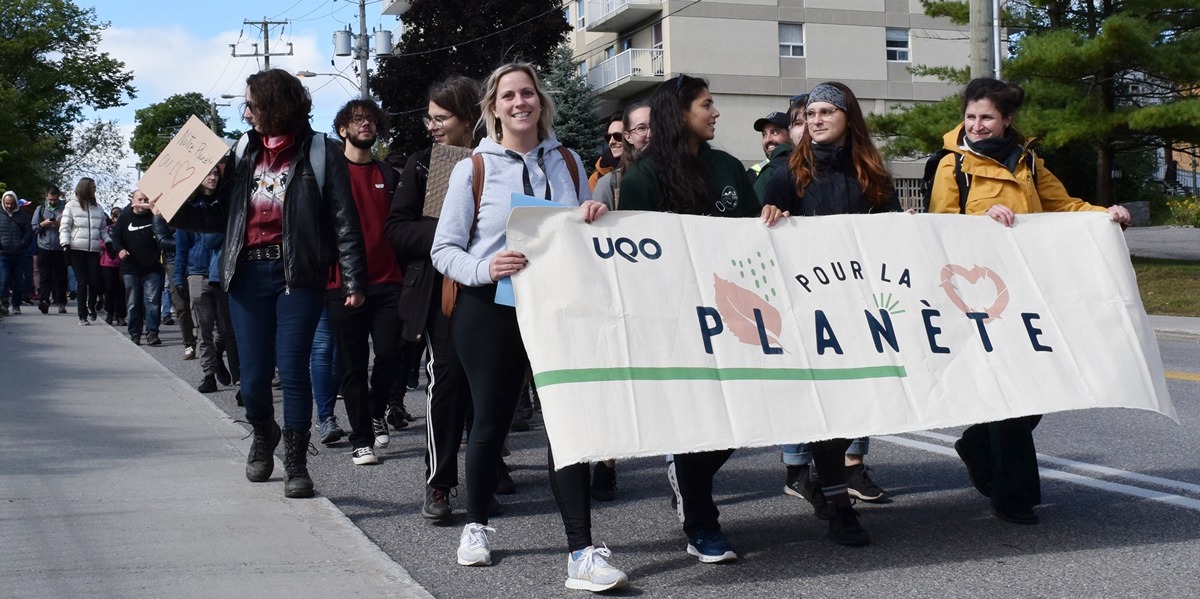
Gatineau climate strike action, September 23, 2022
The Quebec ruling class says that the environment is a Quebec value that it defends. Is it really the case? Just take a look at Bill 44, An Act to provide for the effective governance of the fight against climate change and to promote electrification passed by the National Assembly on October 20, 2020 by a vote of 74 to 47. On the strength of this law and its plan to make Quebec "the battery of North America," the Coalition Avenir Québec (CAQ) recently announced its intention to double the capacity of Hydro-Québec. As such, it plans to harness new rivers over the next few years. In anticipation of this announcement, the Legault government rejected the creation of a protected area along the Magpie River, a 300-kilometre river that flows into the Gulf of St. Lawrence west of Havre-Saint-Pierre, because of its hydroelectric potential.
Many are opposed to this project, such as the prefect of the Minganie Regional Municipality and the Ekuanitshit Innu Council, who say that they have already lost important areas to the flooding caused by the Romaine River dam. Last year elected officials from the North Shore and First Nations representatives declared the Magpie River a "juridical personality," a status which means that the river is a living entity with its own rights, just like a human being or a corporation. The executive director of the Société pour la nature et les parcs du Québec said, "The vision of Quebec becoming the battery of North America represents a huge risk to the protection of our territory and our biodiversity."
On the other hand, the Legault government's announcement last October to create a "global hub for the battery industry" in Quebec has direct repercussions on the human and natural environment of some 20 municipalities in the Outaouais, especially the Regional County Municipality (RCM) of Papineau where graphite, one of the critical minerals, is found in abundance. In this RCM, there are hundreds of mining exploration claims for the extraction of graphite, and almost every village is targeted by these claims.
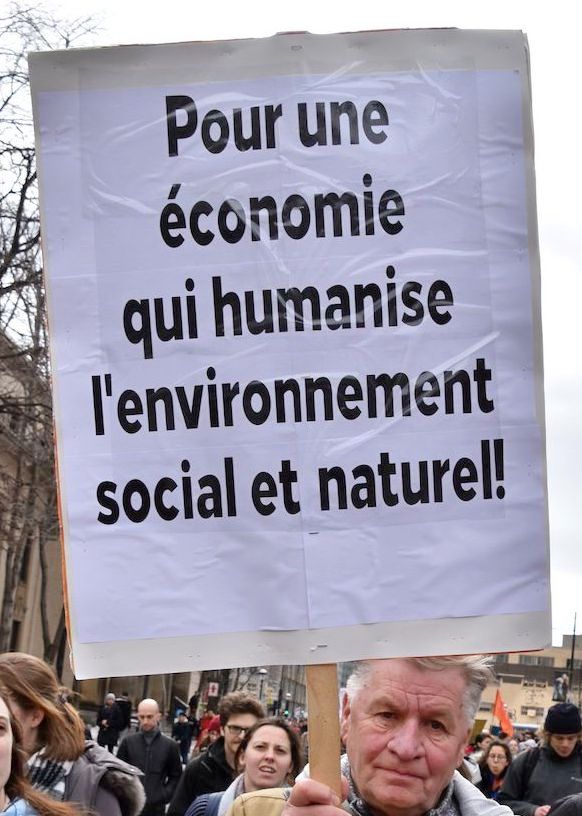 In its "Quebec Plan for the Development of Critical Minerals
2020-2025," the Quebec government claims that "the development of
critical and strategic minerals will allow Quebec to pursue its energy
and technological transition and create quality jobs in the regions
while contributing to the
development of a greener economy.
In its "Quebec Plan for the Development of Critical Minerals
2020-2025," the Quebec government claims that "the development of
critical and strategic minerals will allow Quebec to pursue its energy
and technological transition and create quality jobs in the regions
while contributing to the
development of a greener economy.
Graphite is one of these minerals -- along with lithium, nickel, cobalt and copper -- whose extraction is essential to this "global battery cluster" in which billions of dollars in public funds are being invested by the Quebec government. This critical mineral extraction project is part of the U.S. Mineral Security Partnership (MSP) to secure a supply chain of American-made critical minerals -- a partnership to which Canada is a signatory -- and the federal government's Canadian Critical Minerals Strategy, which is itself closely linked to this U.S. partnership.
Although presented as only useful for electric vehicle batteries, graphite is also a component of military instruments and weapons, such as the graphite bombs used by NATO in the 1995 bombing of Yugoslavia. The graphite bomb is one of the weapons developed by the U.S. military to paralyze electrical equipment without destroying it permanently. When exploding close to the ground, this bomb releases thousands of microscopic carbon fibers that infiltrate all electrical systems -- power plants, transformers and high voltage substations or telecommunication systems -- in order to create gigantic short-circuits.
Currently, mining machines are at work between the municipalities of Duhamel and Lac-des-Plages, on a territory covering the area of several municipalities. Drilling is taking place 500 meters from Lake Doré, described as an exceptional and inhabited lake, just outside the Papineau-Labelle wildlife reserve. This work is part of a 15-year plan to produce 100,000 tons of graphite concentrate with 95 per cent carbon.
According to the mayor of Duhamel and spokesperson for the Papineau MRC, current laws allow mines to be opened almost anywhere. Residents and municipal representatives are getting together to demand a better control over mining in their region. The residents of Petite-Nation have the support of the MRC and the 10 municipalities of the region in opposing these developments. They decry the lack of regulations allowing municipalities and MRCs to control the development of the mining industry on their territory. Even the elected officials claim that they do not have the necessary authority to ensure that the will of their constituents is respected and to protect the recreational and tourism sector, the resorts, forestry and public health. According to the mayor of Duhamel, "If it's about minerals for the future, it's also about our future and we would like to have a say in it."
Pierre Soublière is the PMLQ candidate in Chapleau.
Mining Town of Rouyn-Noranda Demands Government Uphold Environmental Standards
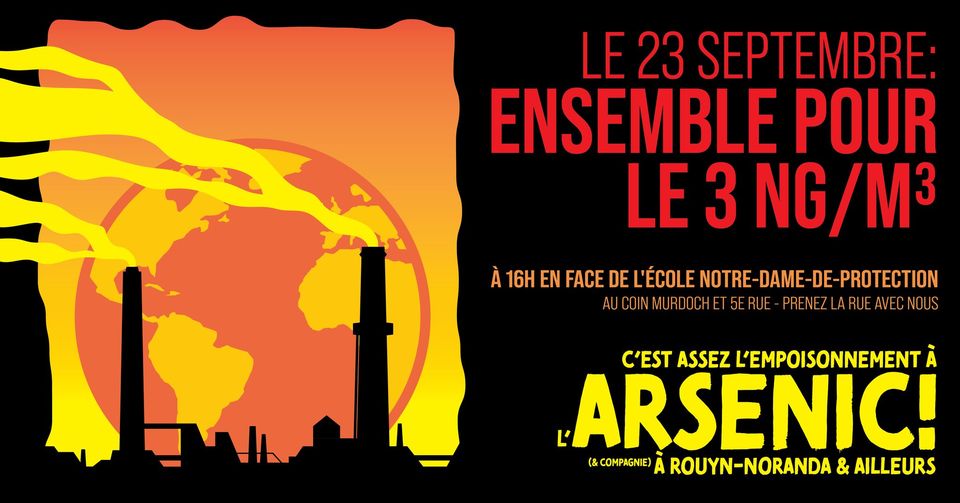
On September 23, the mining town of Rouyn-Noranda organized a march on the occasion of the Global Climate Strike actions to demand that the Quebec government uphold environmental standards to protect the population from arsenic emissions. One of the main demands is that the Quebec government compel the Anglo-Swiss mining/metallurgical giant Glencore to reduce arsenic emissions at the Horne smelter to three nanograms per cubic metre, the official standard in Quebec. The march followed a series of mass actions led by community organizations, including public meetings where residents have been speaking out, making their voices and demands heard.
Workers' Forum spoke with Nicole Desgagnés, spokesperson for the ARET Committee, prior to the September 23 action. ARET is a committee of parents of children in the Notre-Dame neighbourhood, located very close to the smelter. Nicole explained the purpose of the September 23 march of which her committee is one of the main organizers and addressed the problem the people in Rouyn-Noranda face.
 Nicole Desgagnés: The
September 23 march is a demonstration for the planet, in connection
with climate change. It is also related to environmental injustices. We
consider the situation we are experiencing here an environmental
injustice. We know that everything we are
experiencing with regard to climate change has more of an impact on the
poorest and most vulnerable, the poorer countries in particular.
Nicole Desgagnés: The
September 23 march is a demonstration for the planet, in connection
with climate change. It is also related to environmental injustices. We
consider the situation we are experiencing here an environmental
injustice. We know that everything we are
experiencing with regard to climate change has more of an impact on the
poorest and most vulnerable, the poorer countries in particular.
We feel that in Rouyn-Noranda we are also facing environmental injustice in the sense that Quebec standards are not being applied here. One of the important themes of the march is attaining the three nanograms per cubic metre of arsenic in the air which is the official standard in Quebec as well as that of the World Health Organization.
Several community organizations are involved in organizing the march, including the Regroupement d'éducation populaire de l'Abitibi-Témiscamingue, La planète s'invite au parlement Abitibi-Témiscamingue, ARET and Mothers at the Front in Rouyn-Noranda. Other situations of environmental injustice also exist in Quebec, in particular amongst First Nations communities.
The mass mobilization in the region to protect the population's health is very strong. Personally, I have never seen doctors as mobilized as they are now. We're witnessing a convergence of many groups within the population. Unions have been mobilized, business people as well. Everyone knows each other here.
WF: You do not agree with the government's proposal and that of Glencore to reduce ambient arsenic emissions at the Horne smelter to 15 nanograms per cubic metre within five years. Can you tell us more about this?
ND: We find the proposal insufficient. In 2004, an opinion released by INSPQ [Quebec National Institute of Public Health] experts on health and the environment recommended that the smelter reduce its arsenic emissions to 10 nanograms per cubic metre within 18 months. These specialists made this recommendation because we had just gone through a period where it had increased to 1,000 nanograms per cubic metre, sometimes for a number of years.
Despite this, between 2007 and 2017 the Quebec government allowed emissions of up to 200 nanograms per cubic metre. And in the government certification that covers 2017 until next November, the government has authorized 100 nanograms per cubic metre.
Research, which has continued to expand since then, reveals that the standard is insufficient. It has shown that we have a lot more lung cancer in the region than in Quebec as a whole, even though we are not heavier smokers than elsewhere. It has also shown that babies weigh less at birth, and some are born with intrauterine growth retardation. Babies have developmental delays. There are a lot of metals here and we need to look into the synergy of these metals. Not many studies have been done regarding the synergy of air emissions of different metals, such as arsenic, lead, cadmium and nickel.
If the standard was 15 nanograms per cubic metre and it only had to do with arsenic, maybe that would protect the neurotoxic situation of children. However, what the scientists are saying is that when we are in a situation with the synergistic effects of metals, we face much greater impacts.
We are saying that the 15 nanogram standard for arsenic could
be a step, but not one to be attained in five years. It must be
achieved immediately. We must reach the 15 nanograms very quickly, and
set a timetable for meeting the three nanogram per cubic metre Quebec
standard as quickly as
possible.
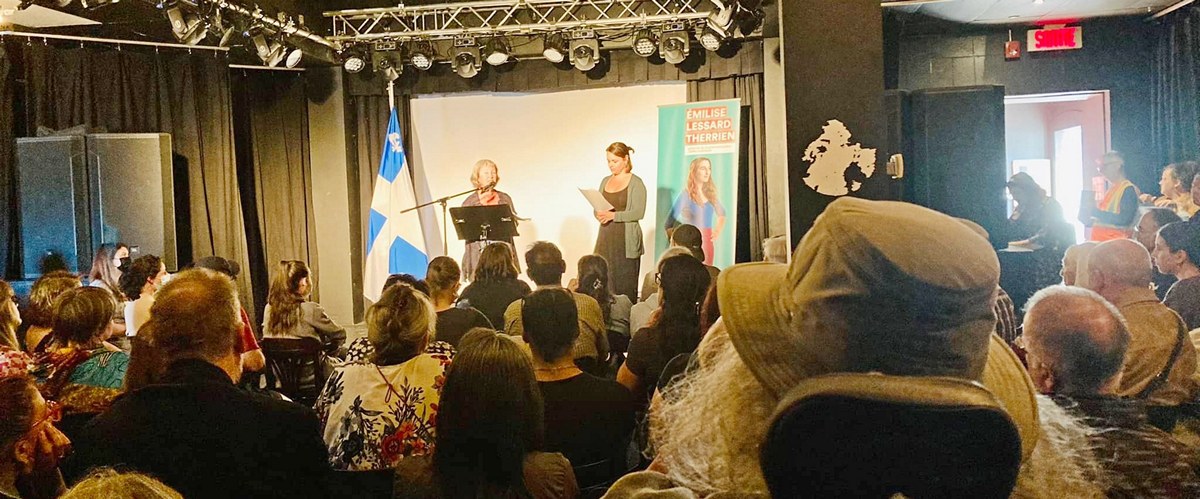
Residents speak out at a
town hall meeting July 8, 2022, demanding the government compel
Glencore to cut its toxic emissions.
The proposal of the Minister of the Environment and Glencore means that we would be living with an emission of over 15 nanograms per cubic metre for five years. During that time, cadmium and other metals would also be higher than the Quebec standard. We're asking that the 15 nanograms for arsenic emissions be reached in the first year. It's possible because already on some days, between 15 and 30 per cent of the time depending on the year, the 15 nanograms level is attained. What increases the emissions are the inputs, the products that are processed by the foundry that are rich in arsenic.
We also know that the earlier you are exposed in life, the more you are at risk later on. We are mortgaging people's lives and we know that our life expectancy is on average two to five years lower than other cities, as well as Quebec's average.
We don't appreciate the government's position either that when we reach 15 nanograms, a part of the city -- around 85 per cent -- will have emissions of three nanograms per cubic metre. The rest, such as the most affected neighbourhood which is located near the smelter, will continue to have emissions of 15 nanograms. This is a divisive argument that is not acceptable.
The government announced an online consultation on arsenic to begin on September 6. We've gone through the consultation on nickel in Quebec, and the reports were unanimous, even from public health, and yet the government did not listen to the scientists. It dramatically increased the nickel emission limit .[Last April, at the express request of Glencore, the government decided, by regulation, to allow a nickel emission level in Quebec that is five times higher than the emission limit in effect at the time - TML Ed Note.] This leaves us skeptical about the value of the public consultation that the government is undertaking in Rouyn.
The government is also proposing to hold a public meeting on the issue. This is a bit troubling. It will make things very emotional, with workers concerned about the possibility of losing their jobs. I think that the government cannot escape its own responsibility, which must be based on science. It has to take responsibility and do its job. That is why we did not approach Glencore directly with our concerns and demands. The Quebec government must take its responsibility.
In conclusion, we need the support of all of Quebec because I think that the struggle we are waging will have an important symbolic impact on all of Quebec.
(Translated from the original French by TML. Photos: ARET, E. Lessard-Therrien)
About the Labour Shortage and the Environment
We have to recognize that there is a labour shortage in all sectors -- in the forests, in the mines -- actually in all industries. There is a shortage and there are not enough people to take over. The baby boomers are retiring, the birth rate is not sufficient to meet the demand, and above all there are several problems that persist concerning the recruitment and retention of workers. Workers are changing employers and companies are not able to retain their workers.
Of course, money plays a role, but there are many other aspects and current policies fall short in attracting and retaining workers. Even with the labour shortage, we could solve the problem of skilled labour through training courses, through immigration. There are ways to do it but there is no common policy. There are a lot of researchers who are addressing the issue and workers also have a lot of ideas that could be implemented to help address the labour shortage. It's true that COVID has amplified the situation, but there are still solutions.
In my opinion, professional training is an important solution. I know, for example, that in the mining and forestry sectors, there is a great need for specialized workers. We have workers who have a basic course but the technology changes rapidly and they are not able to upgrade themselves. There should be continuous training within the company. If you don't provide workers with continuing education, they will drop out and go elsewhere. There needs to be a lot of emphasis on professional training and the recognition of skills acquired within the company, with promotion of workers. Right now, it's the unions that have to fight for it.
In my work at the mine, I had to fight to get the mine to accept this, telling them that if you want to retain workers, you have to train them. Instead of doing continuous training, and recognizing skills through wage increases for example, companies tend to subcontract the work, and thus have a workforce they can get rid of when it suits them.
Also, family life is becoming more and more important. Conditions that allow for a quality family life is important for young people, more so than it was in our time. That's good, it's a change for the better. The primary sector companies like the mining sector are not aligned with this. It affects the retention of workers.
Another issue that I think is very important is the environment. We must have clear policies, agreements with companies that they must respect current standards. The public cannot respect an industry if it does not respect environmental standards. The quality of life at the workplace, the quality of the work environment, the quality of the air is very important for all workers and the population.
For example, the forestry industry in Abitibi is a real disaster from an environmental point of view. The Minister in charge of the sector is clearly serving private companies. I have a four-wheeler and I walk in the forest with friends. As far as forest roads are concerned, what I see I call a massacre of the forest, a huge waste of wood. There is no one to control what is going on. The companies only take the wood that brings them money, and the rest of the wood is left to rot on the spot. I'm not a specialist but I wonder how it is that the inspectors, if there are inspectors who monitor the situation, let things like this go with so much waste.
Young people are increasingly demanding a quality environment, and rightly so, because they are the ones who are going to face the problem.
Today, production must include respect for the environment. In order to be allowed to produce, you must respect the environment.
That's a big concern. Young families will think twice before coming to a region where environmental standards are not upheld.
Politicians and candidates must listen to the people, listen to the people who work and provide services. In health care, many elderly people have died in the last few years, especially during the COVID pandemic. It is terrible but the problems are still there. They have not been solved. These problems should not be swept under the rug during the election.
(Translated from the original French by TML.)
For Your Information
Candidates
and Political Parties in
October 3 Election
With a few days until the October 3 election, Élections Québec informs that 880 candidates are running in 125 electoral divisions in Quebec. This is a decrease of 60 candidates compared to the 940 candidates in the previous 2018 election. Fourteen independent candidates are on the list. There were 21 in 2018.
At the time the elections were called, 27 political parties were registered, compared to 19 in the 2018 elections. Of these parties, 19 fielded candidates, whereas all parties registered in 2018 fielded candidates.
It is possible for a political party not to run a candidate in a general election without losing its authorization. Elections Québec states that "an authorized political party that does not present a candidate during a general election or a by-election may choose to act as a private intervener. It must then notify the Chief Electoral Officer." The title of private intervener allows for a maximum expenditure of $300 in advertising during the election period.
Of the 880 candidates, 33 per cent are women, an increase of three per cent from 2018. Of the parties in the National Assembly, Québec Solidaire has the highest percentage of female candidates -- 70 out of 125, or 56 per cent. Of the twelve candidates of the Marxist-Leninist Party, 50 per cent are women.
The average age of candidates is 45, as it was in 2018. The 40-49 age group therefore has the highest number of candidates, with 27 per cent of candidates. In 2018, 18 per cent of candidates were aged between 18 and 29, compared to 14 per cent for the October 3 elections.
Note that to be recognized as a parliamentary group, the Standing Orders of the National Assembly provide that "a political party must, at the most recent general election, either have had at least 12 MNAs [Members of the National Assembly] elected or have obtained at least 20 per cent of the votes." It should be noted that in the 2018 election, Québec Solidaire and the Parti Québécois were recognized as parliamentary groups following an agreement with the Legault government, even though they did not meet the requirements.
Here is the list of the 27 political parties authorized by the Chief Electoral Officer of Québec and the number of candidates running in the October 3 election.
Alliance pour la
famille et les communautés
2 candidates
Bloc
Montréal - Team Balarama Holness
13
candidates
Bloc pot, Daniel
Blackburn
0 candidates
Climat
Québec
54 candidates
Coalition avenir
Québec
125 candidates
Démocratie
directe
8 candidates
Équipe
autonomiste
10 candidates
Unity Is Strength
9
candidates
New Democratic
Party of Quebec
0 candidates
Party 51
5
candidates
Parti
accès propriété et
équité
1 candidate
Québec
Animal Party
0 candidates
Canadian Party
of Quebec
20 candidates
Conservative
Party of Quebec
125 candidates
Parti culinaire
du Québec
2 candidates
The Human Party
of Quebec
2 candidates
Quebec Liberal
Party
125 candidates
Parti
libertarien du Québec
1 candidate
Marxist-Leninist
Party of Quebec (PMLQ)
12 candidates
Parti nul
9
candidates
Parti pour
l'indépendance du Québec
0
candidates
Parti
Québécois
125 candidates
Green Party of
Quebec
73 candidates
Québec
intégrité
0 candidates
Québec
Solidaire
125 candidates
Québécois
unis pour l'égalité
0
candidates
Union nationale
1
candidate
(To access articles individually click on the black headline.)
Website: www.cpcml.ca Email: editor@cpcml.ca



